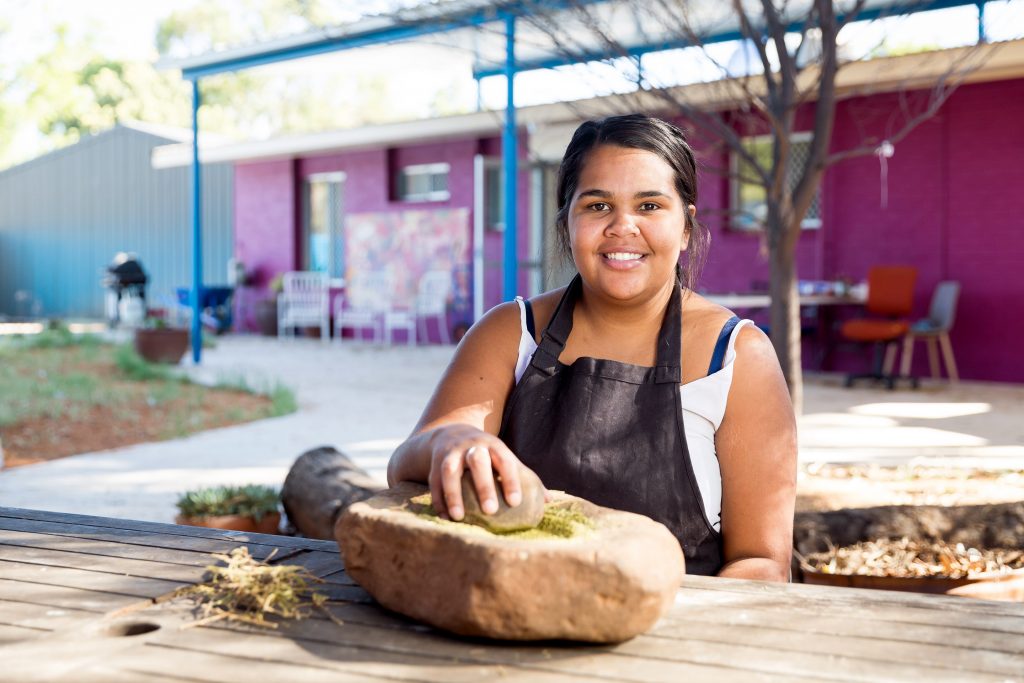
Twenty-one year-old Michaela is helping to build a social enterprise for people with chronic illnesses at The Purple House in Alice Springs.
Featured in Project Compassion 2014, the First Australian-run Wellbeing Program, uses its profits to connect and care for dialysis patients who are far from home.
The program helps keep traditional knowledge strong and gives new hope to staff and patients alike.
Michaela is a young Alywarr woman, who has lived in both Alice Springs and Adelaide while she was growing up.
As a Purple House trainee, she completed a Certificate IV in business management and was recently promoted from administration trainee to permanent employee, working on The Wellbeing Program.
The Purple House is a ‘home away from home’ for First Australians who are suffering from chronic kidney disease and have to travel far from their traditional lands to receive treatment.
Michaela helps care for patients as they receive dialysis, and helps them to remain hopeful and connected to country during treatment. Patients in turn pass on traditional knowledge to Michaela who is eager to listen and learn.
“We cook roo tails on the fire in the garden and we make damper which I learnt [how to] from the older ladies. We also take them out bush hunting for witchetty grubs, honey ants and bush fruit,” Michaela says.
“It has taught me the clinical side of dialysis and importance of diet to help our patients to feel comfortable,” she says.
The Wellbeing Program at The Purple House is run by the Western Desert Nganampa Walytja Palyantjaku Tjutaku Aboriginal Corporation, with support from Caritas Australia.
First Australians are twice as likely to experience chronic kidney disease, and four times more likely to die from it than other Australians*.
With the help of staff like Michaela, the Aboriginal-controlled service gives patients the opportunity to stay connected with their culture.
They do this through traditional healing practices and income-generating activities, such as making bush balms and soaps. The patients are sharing their knowledge and handing down wisdom to young people, like Michaela.
“It makes me feel very happy that I can help and I can spend time with the patients and learn from them. Also, I love making the bush medicines because that’s another part of my culture.”
Michaela says that making and using the bush balms helps patients to feel a sense of home.
Profits from the business are invested back into supporting dialysis patients receiving remote care and help to get people on dialysis back on country.
Sarah Brown, CEO of The Purple House says there is good evidence that people on dialysis in Central Australia are doing much better and surviving longer than elsewhere in Australia.
Sarah explains that for people living on country, “Dialysis used to be a one-way ticket to Alice Springs. Sick, homesick, miserable. Missing family, country, waiting for dialysis, waiting to die. Now people have things to do, plans to make, grandkids to teach, country to visit.”
Business is also flourishing, with income from bush balm sales almost doubling since 2015, and retail stockists growing across Australia.
“We are not passive recipients of care. We are focussing on good food, good company and sucking the juice out of every day we have together,” says Sarah Brown.
Employment opportunities are growing too, with the program supporting an increasing number of trainees and part-time employees.
Michaela is proud of her role at The Purple House. In addition to completing her studies, she has obtained a driver’s licence, is running workshops solo and has travelled interstate several times for work.
“She is a great role model for her family and other young people in her orbit. This job is giving Michaela a range of options for the future,” Sarah says.
“Hope means having something to look forward to,” says Michaela. “I would like to thank people for their support, I feel very honoured to be a part of Project Compassion.”
“I enjoy building relationships with the patients and learning from them,” she says.
“I think it’s very important for us to feel proud of who we are and ensure that my children and their children can say where they are from and feel proud of that. If we keep our culture alive we can feel strong.”
*Australian Institute of Health and Welfare 2017